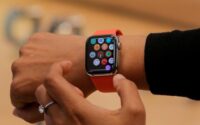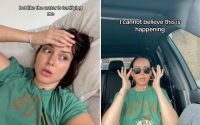I shop in my sleep because of a rare disorder — I’ve racked up thousands in debt
Confessions of a sleeping shopaholic.
One English woman opted out of counting sheep for sleep and instead is adding items to online shopping carts during late-night spending sprees.
Kelly Knipes, 42, confessed that she spent more than $3,800 on shopping while snoozing due to a rare sleep disorder.
“It’s really upsetting and frustrating going to bed thinking, ‘I don’t know what the night is going to lead to,’” Knipes revealed to South West News Service.
In 2018, she was diagnosed with parasomnia, a condition involving abnormal and undesirable behaviors that occur during sleep.
“A person with parasomnias may seem to be alert, walking or talking, or eating or doing other such activities but without awareness because the brain is only partially awake,” according to Yale Medicine.
Over the years, Knipes has awoken to packages she’s ordered while sleeping, such as a full-sized plastic basketball court including a net, pole and backboard.
She’s even ordered tins of paint, books, salt and pepper pots, a children’s playhouse, fridges, tables and hundreds of Haribo candies.
“I was racking up debt everywhere,” she admitted. “I would never actually have to put any credit card details when I was buying things online because it was all saved on my phone.”
Knipes’ sleeping habits escalated when she revealed her personal financial information to scammers via text message.
“I gave them all my details, then when I woke up, they had taken $317 out [of] my bank account,” she said. “I wouldn’t have replied to it if I was awake.”
She claims that the first incident opened the floodgates to several fraud attempts on her accounts but, luckily, her bank has been able to block the transactions.
“I’ve had to cancel cards a few times, and I’ve had lots of people try to take money out [of] my bank,” she sighed, admitting she suspects the fraudsters sold her information.
Unfortunately, Knipes, who runs an event business, could not return most of the items she purchased.
“I couldn’t refund any food purchases, like the Haribos,” she added. “I kept the tins of paint and the [play] house because when that arrived and my kids saw it, I felt I couldn’t return it.”
Eventually, the compulsive shopper paid off her purchases but still suffers from the consequences.
“It can be anxiety-inducing,” Knipes shared. “Everyone thinks it’s funny but it’s not. Some bits are, but some bits are quite serious.”
The Essex, England, resident blames her sleep apnea — which WebMD described as a severe “sleep disorder that happens when your breathing stops and starts while you’re asleep” — for the rare parasomnia diagnosis that has progressively gotten worse.
As a mother of three disabled children, who have epilepsy, deafness or learning challenges, Knipes avoids sleeping pills so that she can remain alert throughout the night in case her kids need her.
Her unconventional sleeping habits began after her first child was born; Knipes started sleepwalking, which transitioned into her spending habits.
However, the disorder has lured her to other dangerous behaviors, too, such as an overdose of diabetes medication, finding windows and doors open, and having to be hospitalized.
Knipes continues to deal with her battle with sleep disorder by wearing a continuous positive airway pressure (CPAP) device to keep the airway open at night.
Although the device has helped immensely, it caused her jaws to lock while sleeping, so she unknowingly removes the machine from her face, reverting the efforts made.
The mother of three doesn’t let the misfortunes bog her down; instead, she remains positive.
“It’s just something that happens that I have to deal with,” she said. “But it’s the least of my problems. In the grand scheme of things, I just focus on my children.”


